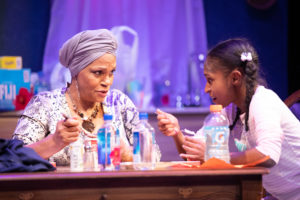By Patsy Isenberg
“Wrong River” is a story about six people in a home in Flint at the start of the water crisis. It’s intense and delves into each character’s personal reaction and how the water crisis intensifies and complicates their lives.
It premiered at The Flint Repertory Theater last weekend and runs through Sunday afternoon, Feb. 20. The production is directed by Flint native Jeremiah Davison, now of Atlanta.
Playwright Josh Wilder of Philadelphia, who brought the play to Flint originally during The Rep’s New Works Festival, examines each family member’s interactions with the others. It gets pretty messy, and is particularly heart-wrenching at depicting the effects of the crisis on Flint’s children.
For Flint viewers, of course, the material of the play is personal — and playwright Wilder gets it.
“It has been one of the most soul-fulfilling experiences I’ve had while working on a play,” Wilder says, adding that it was “an honor even being here, having this play be embraced at the source.”
He says the play asks, “What parts of ourselves do we tap into to survive a disaster? What parts do we leave behind?” And he mentions again how important the issue of how children have been handling it.
Spoiler alert: in the end, his characters all get through it, at least, and solve some of their problems and find ways to improve some situations that they’d been struggling with. But it is a rough road to get there.
This Black family consists of a married couple, Vick and Leah, Dayla, their 10-year-old daughter, and the father’s best friend Danté who all live together. Lisa, Leah’s sister and Dayla’s aunt, who had fled Flint to live in Detroit, and their mother June who has recently died, also appear in major roles. The young girl calls her Granny.

Cast and Crew of Wrong River production. (Photo by Patsy Isenberg)
The first scene is news footage of the deceased grandmother the young girl is watching on TV. Granny is shown lecturing Councilman Eric Mays at a city council meeting insisting that he needs to do something about this water problem. Mays doesn’t speak in this scene and the grandmother’s speech here is quite long, angry and heartfelt.
The time of year is just before Christmas and it becomes clear back at the house that the couple is having marital difficulties as well. As the play progresses the problems each character is dealing with are being exacerbated by the water crisis.

Wrong River poster. (Graphic source: The Rep)
Their water has been shut off, the father’s in danger of losing his job at Walmart, the grandmother has died, and some of the characters are experiencing skin problems due to the lead in the water, and the girl is having trouble in school. Money is tight, the toilet needs to be flushed more often, and that’s just the beginning.
Wilder uses a literary technique in this play known as “magical realism” by including imaginary scenes of Dayla and Granny together. Britannica.com describes magic realism as a “chiefly Latin-American narrative strategy that is characterized by the matter-of-fact inclusion of fantastic or mythical elements into seemingly realistic fiction.”
Wilder says the magical realism technique allows us to “… see how a 10-year-old child who is lead poisoned fights to save her family and the whole city in a world she creates within her hallucinations, dreams, and seizures that all derive from her effects of the lead.”
It’s confusing at times in the play but also offers insight about the relationship between Dayla and her grandmother . Those scenes supply some of the grandmother’s knowledge of how the river became the “Wrong River” and what Dayla perceives her Granny is asking her to do about it.
Dayla is played by 25-year-old Nikyla Boxley convincingly as a 10-year-old girl. Her voice and mannerisms accomplish this. Costume designer, Kendra Babcock and makeup consultant Alexander Stimson also added their skills to help with the transformation.

Actresses Madelyn Porter(l) and Nikyla Boxley(r) in Wrong River. (Photo source: The Rep)
Boxley, a 2019 graduate of University of North Carolina School of the Arts, School of Drama makes her Flint Repertory Theatre (The Rep) debut in this play but has other recent credits such as “Freedom Summer,” “The Niceties,” “Maid’s Door,” and We are Proud to Present.”
Madelyn Porter of Detroit played the role of June/Granny. Porter has been in several plays at The Rep and Flint Youth Theatre in the past including “The Effect of Gamma Rays on Man in the Moon Marigolds.” She has performed with many Detroit acting associations and was the recipient of the 2019 Kresge Arts in Detroit – Literary Arts Award. She says, “I am proud to be a Flint Rep Associate Artist. This is home to me. I love what the company offers the community and artists of all ages and stages…quality theatre.”
Curtis Morlaye played the role of Vick. Morlaye has a long list of TV appearances as well as the Off-Broadway production of “Lockdown. He is a 2018 graduate of The Yale School of Drama receiving his MFA. Morlaye was born in Liberia but raised in New Orleans.

Actors Curtis Morlaye and Henri Franklin in Wrong River. (Photo source: The Rep)
Best friend, Danté, was played by Henri Franklin, a graduate of Wayne State University’s Theater Program. Franklin is a SAG-AFTRA actor who works in the fields of stage, film, television, commercials and voice-overs. He “looks forward to continuing to do work that changes lives for the better.” This is Franklin’s Rep debut.
Jade Radford played Leah, young Dayla’s mother. Redford received a BFA from SUNT Purchase Conservatory of Theater Arts. She’s appeared in numerous theater and TV productions and says to her friend Josh Wilder (this work’s playwright) “who knew 5 years later we’d be on this ride together, I am honored to share space with you brother, Here’s to many more.”
Parris Sarter plays the role of the visiting sister and aunt to Dayla. Sarter is an actor based in Atlanta and is the recipient of an M.A. in performing arts from Savannah College in Arts and Design.
She’s won awards for her acting, including an online one-woman performance as Nina Simone in “Eunice in Paris” which was selected as one of Atlanta Magazine’s Best of 2021.
“Wrong River” director Jeremiah Davison, born and raised in Flint, now lives in Atlanta. His list of projects he’s worked on are too numerous to list, but one is particularly of note: directing “Salt, Pepper, Ketchup” written by Josh Wilder.

Wrong River Director Jeremiah Davison. (Photo source: The Rep)
Davison brought pop culture references and special sound and lighting effects to the stage with the help of many. Some of these included rap music, wrestling references, projected images of the Flint Water tower, and the sounds of water rushing during the “magic realism” scenes. Marie Laster is the Scenic Designer. Jasmine Williams is the Lighting Designer. Mikaela Fraser is the Sound Designer/Sound Engineer.
Alison Dobbins is projections designer. Paige Conway, Patrick Ian McCall and Katherine Nelson collaborated on stage management. Jesse Glenn, a Flint native was Technical Director, and William Irwin was the Fight Choreographer who is an Associate Professor for U of M-Flint as well. Matthew Cremeans did the Props Design and is also an actor.
Director Davison met Wilder quite by accident at a theater where Davison was working on a play that Wilder had come to see with a mutual colleague. But, as Davison states in his director’s note, he and Wilder were “destined” to meet.
Davison had heard that Wilder was working on a play about Flint, so he mentioned to Wilder that he was from Flint “as all Flintstones do,” Davison says about introducing himself. He says that he’s used to getting “a moment of judgement that usually happens” when people claim their roots in Flint.
Eventually the two men connected to discuss the play and Wilder asked Davison to direct. Davison learned that Wilder came to Flint during the “height of the crisis in 2014/15.” Wilder attended council meetings, talked to activists and delved into life in Flint during this.
They ended up bringing “Wrong River” to The Rep’s New Works Festival where Michael Lluberes wisely chose this one to be read by actors in front of an audience. Lluberes later arranged for the play to be produced at The Rep.
There are still four more performances this weekend at The Rep’s Elgood Theatre: 8 p.m. Friday, Feb. 18; two on Saturday, Feb. 19 at 2 p.m. and 8 p.m. and a final performance at 2 p.m. Sunday, Feb. 20. Go to flintrep.org for more information and to buy tickets. This play is sponsored by Jay and Jennifer Jolliffe.
EVM Theatre reviewer Patsy Isenberg can be reached at pisenber@gmail.com.


You must be logged in to post a comment.